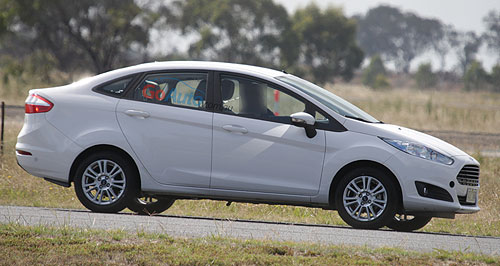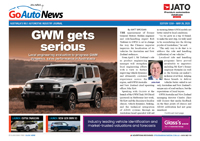News - FordExclusive: Ford Oz working on Fiesta-based carOn test: Ford’s Australian-based engineers are putting this Fiesta through chassis testing in what points to preliminary work for a new light car for emerging markets. Another recycled budget light car in the works from Ford’s Australian team17 Mar 2015 FORD’S Australian engineering and design team is believed to be working on a little sister for the Australian-developed Escort small car, most likely again on behalf of Ford Motor China for production and sale in the world’s biggest motor market. The new budget model – the third such vehicle developed in Australia on a recycled Ford platform – is thought to be based on the current sixth-generation WZ Fiesta light car that traces its lineage back to 2008 and which is set to be replaced in western markets in a year or two. Such a low-cost vehicle would follow in the wheel tracks of Ford Asia-Pacific’s Victorian-designed and -engineered Figo light hatch for India and, more recently, the Focus-based Escort small sedan launched in China last year. As our pictures here show, current-generation left-hand-drive Fiesta sedans have been in chassis testing at Ford Australia’s You Yangs proving ground near Geelong in Victoria, in parallel with General Motors’ big-selling light sedan in China, the Chevrolet Sail. Intriguingly, a Brazilian-built Hyundai light hatchback has also been spotted by GoAuto among cars being benchmarked at the facility that is awash with test vehicles for Ford Motor Company development projects ranging from the all-new North American Ford Taurus to a short-wheelbase Ranger ute. It is unclear if this Hyundai i20-based HB20 – HB stands for Hyundai Brazil – is related to the new light-car project, but if it is, it could mean the car under development might be headed to South America too. Similar in size to the Fiesta, the five-door HB20 hatch and its HB20S sedan sister are related to the two different versions of the i20 made elsewhere, including in India and Turkey, but the Brazilian model features different styling with unique sheetmetal, as well as different powertrains. The vehicle spotted at the You Yangs facility carries a ‘1.6 Flex’ badge on the boot, indicating it is equipped with Hyundai’s ethanol-capable four-cylinder engine that is popular in Brazil where ethanol made from sugarcane is the fuel of choice. The test car was fitted with microphones – including one hanging off the back bumper – and wiring from the engine bay to a laptop computer mounted in the passenger seat of the left-hand-drive hatchback. This points to NVH (noise, vibration and harshness) testing. While the Hyundai has been spotted just recently, examples of the Chevrolet Sail have been under test by Ford in Australia for some time, not just at the proving ground but also on public roads. Launched in 2010, the current Sail is offered in sedan and hatchback forms with a choice of 1.2-litre and 1.4-litre petrol engines, both with a manual gearbox. The first compact car to be designed and engineered at GM’s Shanghai Pan-Asia Technical Automotive Centre in league with joint-venture partner SAIC, the Sail has also gone into production in India and – interestingly – South America, in Columbia and Ecuador. Ford Asia-Pacific has been massively expanding its engineering and design presence in Australia to take on new projects for head office in Detroit, becoming the largest unit of its type in Australia. By GoAuto’s count, about eight new Ford models appear to be receiving engineering attention at the Australian proving ground. And that does not count projects that are no doubt underway behind closed doors at the Ford Asia-Pacific design centre next to Ford Australia’s head office on Melbourne’s northern fringe and at the Geelong engineering centre. Another new light-car project for Ford’s Australian team would mark a further feather in its cap, reflecting Ford Motor Company’s respect for the local talent in the wake of the successful development in Australia of the global Ranger ute – soon to get a facelift – and the related Everest SUV that is set to be launched later this year. If the new light-car project follows the successful pattern of the Figo and Escort developments, the Australian team will re-skin the current Fiesta with a new outer body, fit it with a cost-effective but tough suspension suited to the target countries and line it with a durable but affordable interior. A low-cost powertrain will complete the package. Ford Australia will not confirm or deny the existence of the project, saying only that its design and engineering operation in Australia is involved in a number of projects for the global organisation. It is unclear if the new model will replace the Australian-developed Figo that has done service in the subcontinent and numerous export markets since 2010. However, that model is about to get a major makeover that includes Ford’s latest small-car styling cues for the hatch and the addition of a US-designed sedan dubbed Figo Aspire in India. In Brazil, the mini sedan is called Ka. No launch timing for the potential new model has been forthcoming, but based on the lead times of the Escort, it could appear about 2017.  Read more |
Click to shareFord articlesResearch Ford Motor industry news |























Facebook Twitter Instagram